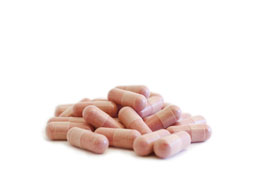Cranberry pills are known to treat UTI (urinary tract infection) in an effective way. The dose and duration of the course is determined by the doctor, depending on the patient's complaint. This Buzzle excerpt throws light on the working of these pills in treating UTI and their possible side effects.

Cranberries are used to treat a number of ailments since ancient times. They are available in the form of pills, juice, dried and sweetened cranberries, etc. They are a rich source of antioxidants, which fight against free radicals present in the body and keep numerous infections and disorders at bay. Cranberry, in the form of pills, is widely available in various health stores and is quite popular among masses. These pills are the concentrated form of cranberry juice and are used to treat a number of maladies. One of the ailments, which can be effectively treated with the use of cranberry pills is urinary tract infection (UTI).
How Do These Pills Work?
- Cranberries are rich in proanthocyanidins, a compound which is similar to antibacterial drugs. This compound inhibits the development of E. coli, which is the bacteria responsible for urinary tract infection.
- Proanthocyanidins also have anti adhesive properties, which means they prevent the bacteria from clinging to the inner wall of the urinary tract. The body of the bacteria also undergoes modification as a result of this chemical compound and lose their ability to create infections.
- These pills also have citric acid in them, which increases the acidity in the urine. The raised level of hippuric acid in the urine makes it impossible for the bacteria to flourish.
- Research has also proved that, cranberry also acts as a communication barrier among bacterial cells. The bacteria release a chemical called indole from their bodies, which is used as the means of communication between cells. The compounds in cranberries condense the bodies and inhibit the production of indole. A failure to communicate with other bacterial cells, reduces the risk of contracting the infection. They also fight against other infections related to the bladder and the urinary tract.
Side Effects
Though there are many benefits of taking cranberry pills, there are also a few side effects, which can be seen as an allergic reaction observed in some individuals, and may arise due to improper dosage.
- Individuals who are allergic to cranberry and its extracts may suffer from allergic reactions like hives, difficulty in breathing, etc. Skin rashes, which may resemble small, red boils may also erupt and cause itching.
- The pills may also interact with certain drugs, like anticoagulants or antacids and reduce their effects.
- People suffering from diabetes should avoid taking cranberries or any of their supplements since the sugar content in cranberry is quite high and may increase the levels of blood sugar in the body.
- Some individuals may also experience frequent urination, diarrhea accompanied by stomach cramping and a feeling of nausea. In some cases, individuals may also suffer from fatigue, headaches, and dizziness, which may range from moderate to severe.
- Since cranberries have a tendency to accumulate oxalates, this can lead to the formation of kidney stones. However, this side effect can be seen only in rare cases.
Drinking plenty of water and fluids will help keep the infection at bay. However, it is always advisable to consult a physician before consuming any nutritional supplements and medications, as a remedial measure for any infection or disease.






 Cranberries are used to treat a number of ailments since ancient times. They are available in the form of pills, juice, dried and sweetened cranberries, etc. They are a rich source of antioxidants, which fight against free radicals present in the body and keep numerous infections and disorders at bay. Cranberry, in the form of pills, is widely available in various health stores and is quite popular among masses. These pills are the concentrated form of cranberry juice and are used to treat a number of maladies. One of the ailments, which can be effectively treated with the use of cranberry pills is urinary tract infection (UTI).
Cranberries are used to treat a number of ailments since ancient times. They are available in the form of pills, juice, dried and sweetened cranberries, etc. They are a rich source of antioxidants, which fight against free radicals present in the body and keep numerous infections and disorders at bay. Cranberry, in the form of pills, is widely available in various health stores and is quite popular among masses. These pills are the concentrated form of cranberry juice and are used to treat a number of maladies. One of the ailments, which can be effectively treated with the use of cranberry pills is urinary tract infection (UTI).